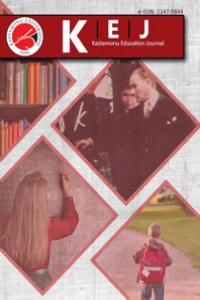Öz
Purpose: The aim of this study is to examine how 2nd graders use their vocabulary knowledge in word games. We investigated how students used vocabulary knowledge in games. For this purpose, a word game which is designed for listening and speaking skills has been chosen.
Design/Methodology/Approach: The case study method, which is one of the qualitative research methods, was used in the study, as an attempt was made to examine how primary school students use their productive vocabulary knowledge in word games. In the analysis stage of the study, the data obtained by the students and their answers to the questions asked during the game were analyzed by the two researchers, the codes were determined, and the data were interpreted by creating the themes appropriate to these codes. Percentage and frequency calculations of the words were grouped under the themes. The research findings were supported by direct quotations where necessary. In the analysis of the interview data, students' answers were subjected to content analysis and they were shared under certain themes and with direct quotations.
Findings: At the end of this study, it was concluded that the students use their vocabulary knowledge through the visuals by producing questions related to the physical characteristics of the character and the profession, and trying to ask questions by using clue words that bring themselves closer to the result in order to win the game. As a result of the interviews, the students expressed that they were very excited about the game. They stated that they gained the skills of asking the appropriate questions and using the correct words to be the winners of the game. In the game process, they experienced difficulties in finding the appropriate words for inquiring about the depth of the word information.
Highlights: During the questioning process, students can express their current understanding of a subject, connect with other ideas and become aware of the points they do not know. In this direction, finding the appropriate word and asking questions is important to win the game and for using productive vocabulary in the first language.
Anahtar Kelimeler
Elementary school students Vocabulary knowledge Productive vocabulary Games
Kaynakça
- Akyol, H. (2008). Türkçe İlk Okuma ve Yazma Öğretimi. Ankara: Pegem.
- Allen, V, F. (1983).Techniques in Teaching Vocabulary. Oxford: Oxford University Press.
- Beck, I, L., McKeown, M, G. and Kucan, L. (2002).Bringing words to life. NY: The Guilford Press.
- Beck, I, L., McKeown, M, G. and Kucan, L. (2005).Choosing words to teach. In H, Hiebertve M, L, Kamil (Ed,), Teaching and learning vocabulary (s.211-225), Mahwah, NJ: Lawrence Erlbaum.
Öz
Çalışmanın amacı: Bu araştırmanın amacı, ilkokul 2. sınıf öğrencilerinin kelime oyunlarında üretici kelime bilgilerini nasıl kullandıklarını incelemektir. Bu doğrultuda araştırmada “öğrenciler kelime bilgilerini oyunlarda nasıl kullanıyor?” sorusuna cevap aranmıştır. Bu amaç doğrultusunda dinleme ve konuşma becerilerine yönelik olarak tasarlanan bir kelime oyunu seçilmiştir.
Materyal ve Yöntem: Araştırmada ilkokul öğrencilerinin kelime oyunlarında üretici kelime bilgilerini nasıl kullandıkları incelenmeye çalışıldığından nitel araştırma yöntemlerinden biri olan durum çalışması yöntemi kullanılmıştır. Araştırma verilerinin analizinde öğrencilerin oyun esnasında sordukları sorular/ kullandıkları kelimeler ile elde edilen veriler iki araştırmacı tarafından analiz edilerek kodlar belirlenmiş ve bu kodlara uygun temaları oluşturarak veriler yorumlanmıştır. Temalar altında gruplandırılan kelimelere ait yüzde ve frekans hesapları yapılmıştır. Araştırma bulguları tanımlanırken gerekli yerlerde doğrudan alıntılarla desteklenmiştir. Görüşme verilerinin analizinde ise öğrencilerin verdikleri cevaplar içerik analizine tabi tutularak belli temalar altında ve doğrudan alıntılara yer verilecek şekilde paylaşılmıştır.
Bulgular: Araştırma sonucunda öğrencilerin kelime bilgilerini, görseller aracılığıyla genellikle karakterin fiziksel özelliklerine ve ardından mesleğine yönelik sorular üreterek kullandığı ve oyunu kazanmak için kendilerini sonuca yaklaştıran ipucu kelimeler kullanarak sorular sormaya çalıştıkları sonuçlarına ulaşılmıştır. Yapılan görüşmeler sonucunda öğrenciler oyunla ilgili hislerinde büyük oranda heyecanlı olduklarını ifade etmişlerdir. Oyunun kazandırdıklarına yönelik olarak ise uygun soru sorma ve doğru kelimeleri kullanma becerilerini kazandıklarını belirtmişlerdir. Oyun sürecinde uygun kelime bulmakta zorlandıklarını ifade etmeleri kelime bilgilerinin derinliğini sorgulamaları açısından yararlıdır.
Önemli Vurgular: Soru sorma sürecinde öğrenciler bir konuyla ilgili mevcut anlayışlarını ifade edebilir, diğer fikirlerle bağlantı kurabilir ve bilmediği noktaların farkına varabilirler. Bu doğrultuda uygun kelimeyi bulup soru sorabilmek oyunu kazanmak ve birinci dilde üretici kelime bilgisinin kullanımı açısından önemlidir.
Anahtar Kelimeler
İlkokul öğrencileri .Kelime bilgisi Üretici kelime bilgisi Oyunlar
Kaynakça
- Akyol, H. (2008). Türkçe İlk Okuma ve Yazma Öğretimi. Ankara: Pegem.
- Allen, V, F. (1983).Techniques in Teaching Vocabulary. Oxford: Oxford University Press.
- Beck, I, L., McKeown, M, G. and Kucan, L. (2002).Bringing words to life. NY: The Guilford Press.
- Beck, I, L., McKeown, M, G. and Kucan, L. (2005).Choosing words to teach. In H, Hiebertve M, L, Kamil (Ed,), Teaching and learning vocabulary (s.211-225), Mahwah, NJ: Lawrence Erlbaum.
Ayrıntılar
| Birincil Dil | İngilizce |
|---|---|
| Konular | Eğitim Üzerine Çalışmalar |
| Bölüm | Research Article |
| Yazarlar | |
| Yayımlanma Tarihi | 25 Mayıs 2021 |
| Kabul Tarihi | 19 Ocak 2021 |
| Yayımlandığı Sayı | Yıl 2021 Cilt: 29 Sayı: 2 |


